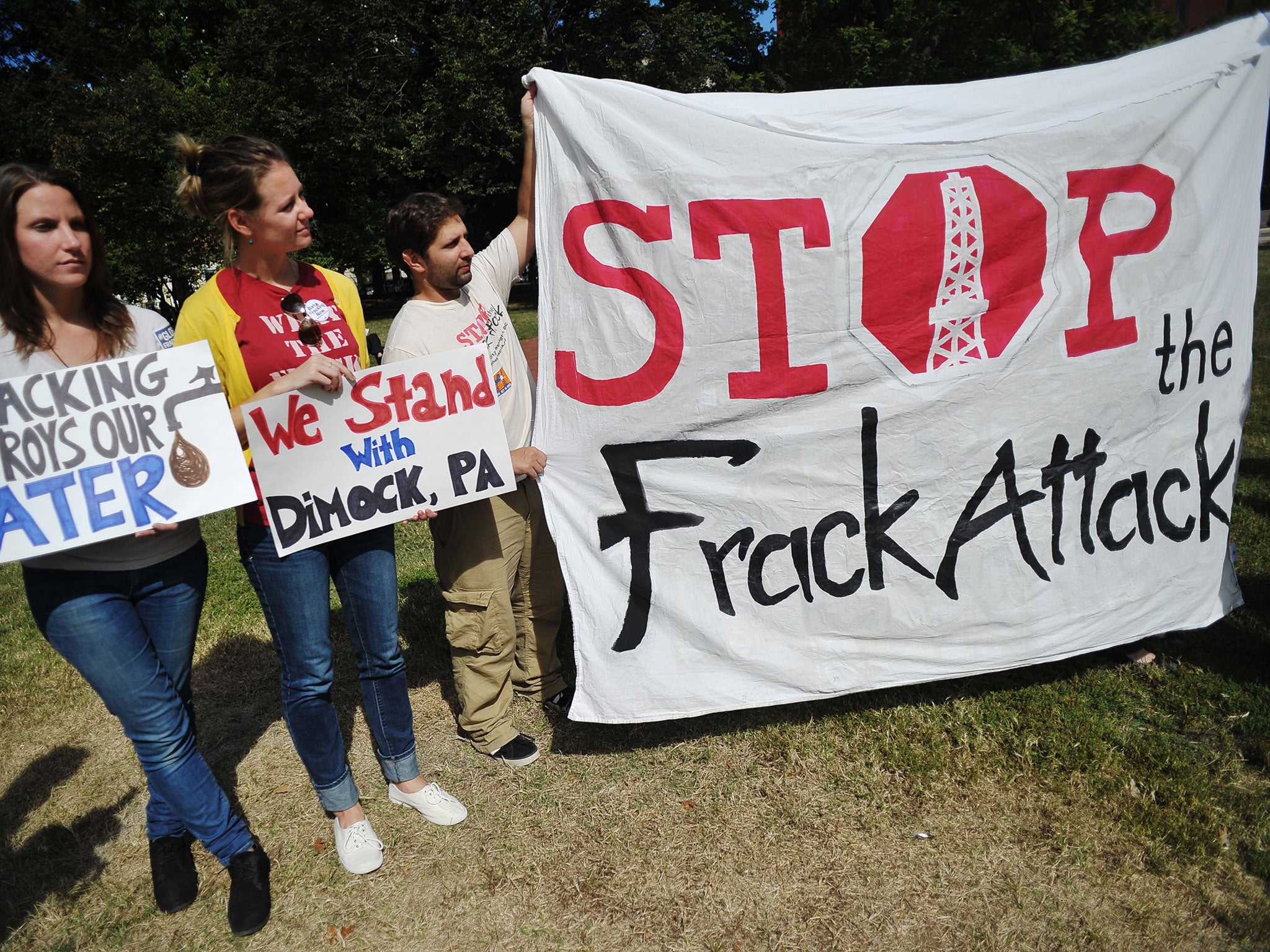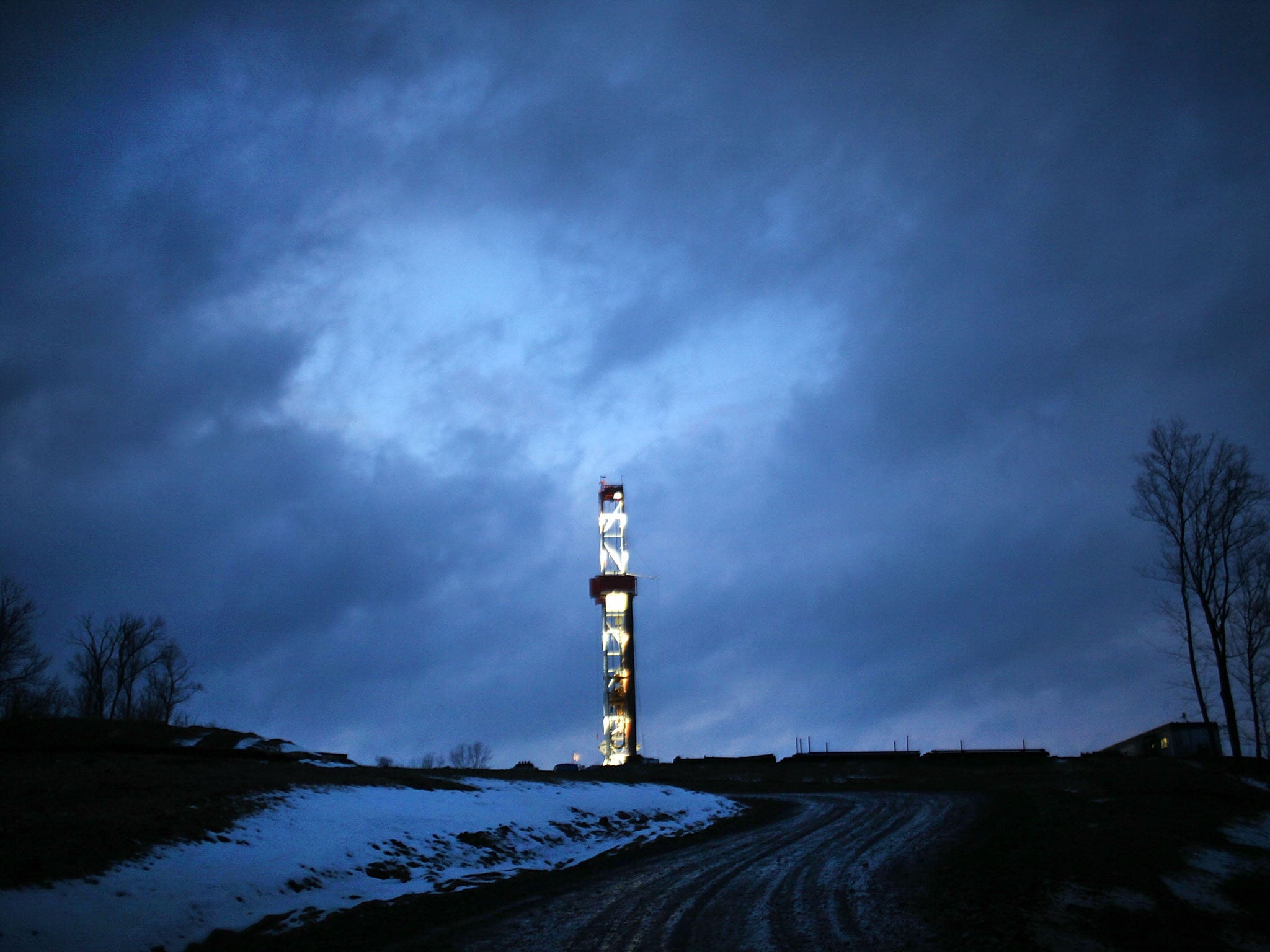Shaken and stirred: How Azle in Texas decided enough was enough with fracking
After enduring more than 30 earthquakes, a small town in Texas has decided that it is time something was done about fracking

Your support helps us to tell the story
From reproductive rights to climate change to Big Tech, The Independent is on the ground when the story is developing. Whether it's investigating the financials of Elon Musk's pro-Trump PAC or producing our latest documentary, 'The A Word', which shines a light on the American women fighting for reproductive rights, we know how important it is to parse out the facts from the messaging.
At such a critical moment in US history, we need reporters on the ground. Your donation allows us to keep sending journalists to speak to both sides of the story.
The Independent is trusted by Americans across the entire political spectrum. And unlike many other quality news outlets, we choose not to lock Americans out of our reporting and analysis with paywalls. We believe quality journalism should be available to everyone, paid for by those who can afford it.
Your support makes all the difference.The point of the 13 January town hall meeting was to organise the locals. And since the locale was a smallish town in Texas – Azle, population roughly 11,000, just far enough from Fort Worth that it doesn’t quite feel like a suburb – that meant the first task, for the handful of fracking critics who led the meeting, was to gently address any reservations that attendees may have had about the purpose of the gathering.
“We were never activists,” says Sharon Wilson, a North Texas resident and organiser for the state chapter of Earthworks, a nationwide, non-profit organisation. “We were not environmentalists. We were just people living our lives, and then the oil and gas industry moved in around us.”
Wilson, of course, is an environmental activist – but only as of a few years ago, when gas production skyrocketed in the Barnett Shale. Still, that gave her considerably more experience than most of the 200 or so people who gathered for the meeting, held in the town’s community centre on Main Street. There was an antiques shop open in the foyer as they arrived, and a few reminders that, until recently, the space had also served as a church at weekends – a sign commanding “Thou shalt not put paper towels or other items in the toilets”, and so on.
Azle is a conservative place; it is represented in the Texas Legislature by Republicans. If people are starting to rumble about the malfeasance of big business, it is because the ground beneath their feet has, of late, been rumbling, too. The area has experienced more than 30 earthquakes since November, including one on the morning of the meeting in question.
None of the earthquakes has been devastating. Most registered between a 2.0 and a 3.0 on the Richter scale. Earthquakes of that magnitude can be felt, though, and their impact can be documented. Residents were woken late at night by the commotion and were worried about their safety and their property values. Students at the local schools have practised a duck-and-cover drill, in case a bigger quake comes along. And, though the earthquakes were the main issue discussed at the town hall, some Azle-ites worried that the tremors could be a harbinger of even worse things to come, such as contamination of the groundwater supply. “How are we gonna clean that up?” shouts a woman in the crowd.
The cause of this upheaval – both literal and figurative – can be inferred. All the earthquakes have happened after oil and gas companies began fracking and disposing of their fracking fluid in injection wells. As many attendees observed, it didn’t take a rocket scientist to conclude that there might be a connection.
Nearly 800 people had attended an earlier town hall meeting the previous week, held by the Texas Railroad Commission, which regulates the oil and gas industry. The agency was apparently not expecting that level of interest and announced afterwards that the state would hire a seismographer to look into the issue.
The organisers at the second town hall meeting celebrated this development. “You folks scared the hell out of ’em,” the crowd is told by Gary Hogan, the president of the North Central Texas Communities Alliance. A murmur of agreement rises from the room.
With that said, Hogan warns those assembled not to feel too reassured because the Railroad Commission still asserts that there is not a definitive scientific link between hydraulic fracturing or injection wells, and earthquakes – which, he says, is a bunch of bull.
Fracking uses high-pressure blasts of fluid to break up underground shale formations, freeing trapped natural gas and oil. The fracking fluid is mostly water, but it includes a variety of additives and chemicals; when it is retrieved from the drilling site, it is often too dirty to be sent back into the groundwater supply. So, every month, companies in Texas dump millions of gallons of it into sealed injection wells deep under the ground.

A number of academics have already documented a connection between such wells and seismic activity. Authorities have stopped injections at several sites, including near the Dallas-Fort Worth International Airport, and sure enough the earthquakes there have stopped.
The idea of definitive proof, Hogan adds, doesn’t make sense. That’s not how science works. Scientific theories are intrinsically probabilistic, he explains. If the Railroad Commission is holding out for absolute certainty, the people of Azle will be waiting forever. Hogan has a better idea: “You shut it down,” he says. “If the earthquakes stop, I think you got your scientific evidence.”
The crowd breaks into applause and, at the end of the meeting, a number of them take the microphone and offer their own remarks. Among them is Gale Wood, who introduces himself as a retired scientist. “What were they thinking, putting injection wells in a heavily populated area like this?” he says. “It’s unbelievable!” It would make more sense, he argues, for the companies to haul their wastewater to injection wells in more remote, less developed parts of the state.
Afterwards, his wife, Barbara, tells me that Gale began his career at Nasa, where he worked on the Apollo moon missions. Her husband actually is a rocket scientist. “I didn’t want them to think I was a know-it-all,” he says by way of explanation.
This meeting, as with the previous one, seems to have an effect. A few days later, state representative Jim Keffer, the chair of the House Energy Resources Committee, names four representatives to serve on a new subcommittee focused on seismic activity. And on 21 January, a busload of people from Azle head to Austin to attend the Railroad Commission’s bi-weekly open meeting, where dozens testify about their concerns and scold the commissioners for their inertia. “If you say we should conserve water, I don’t get why you inject millions of gallons of water a year into the ground at huge pressures,” says one witness, an 11-year-old boy named Robert. “And also I learnt that it’s poisoned water. That is very concerning to me.”
It’s unlikely, of course, that Texas will turn against fracking as a whole. The state has been fairly sanguine about oil and gas companies coming to the neighbourhood since 1901, when the first gusher was tapped at Spindletop and it quickly became clear that energy booms create spillover business for landowners and bartenders and innkeepers. The sheer enormity of this boom’s economic bounty in particular is too commanding to be cast aside.
Even many of fracking’s critics understand this. “You cannot have a shale gas and oil boom without fracking,” Wilson had said at the 13 January town hall meeting. The oil and gas companies use the wells, she explained as she went through some PowerPoint slides, because the alternatives are not ideal.
Recycling much of the fracking fluid is possible but expensive. Another option is storing the waste in above-ground impoundment pits. But then – she showed a picture – you have to worry about having a huge above-ground pool of toxic wastewater that might leak or spill. Like Wood, Wilson is not arguing for an end to the industry; rather, she is calling for a moratorium for now on risky injections.
Most of Azle’s newly minted activists have reserved their harshest criticism not for the industry but for the politicians who are supposed to regulate and oversee the industry – in particular, the three officials who serve on the Texas Railroad Commission. They are the ones charged with regulating oil and gas production in Texas, and, as several townspeople observe, all three have taken plenty of campaign contributions from the industry.
Oil and gas executives, of course, have usually supported the commissioners. The cosiness between the regulators and the industry, and the confidence that people often have in the companies, is a recipe for cronyism and complacency.
From another perspective, though, that dynamic is one reason to believe that the people of Azle and their neighbours may have an impact. If solidly Republican, small-town Texans are upset about the oil and gas industry, it’s a safe bet that something has actually gone wrong.
This article originally appeared in the March 2014 issue of Texas Monthly. Reprinted with permission
Join our commenting forum
Join thought-provoking conversations, follow other Independent readers and see their replies
Comments